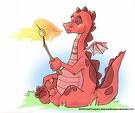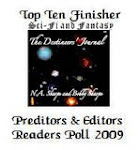 In our concluding look at Archetypal Fantasy Characters, we recognize the following characters:
In our concluding look at Archetypal Fantasy Characters, we recognize the following characters:
Scholar: Possesses great intellect and a love of learning, Scholars are non-combatant in nature, devoting their lives to the study of talents such as medicine, nature, linguistics, and history. Scholars can be a great asset to an adventuring party, even if they lack any familiarity with weapons.
Scribe: Scribes are responsible for most of the world’s written texts. Skilled at both translating and transcribing dozens of written languages, and in the art of Chronicling storytelling, Scribes can be an invaluable asset when it comes to deciphering ancient manuscripts or decoding a ciphered scroll.
Sea Captain: A weather beaten old soul whose only love is his ship and his only mistress the sea. Made strong by many hard years at sea, the Sea Captain sails for both profit and adventure, exploring the far off reaches of the world in search of new resources to exploit and new lands and treasures to claim. Despite their age, Sea Captains are still skilled with a blade, capable of riding out many storms.
Slave: An unskilled individual who has been forcibly torn from their daily life by a Slaver, the typical Slave has a hard life often tortured mercilessly, and sold to the highest bidder as if they were property, the Slave does not have much to live for - except, perhaps, revenge.
Slaver: A nefarious and despicable soul who traffics in the flesh of others, the Slaver is a cruel tyrant who buys and sells people as private property. Intelligent and strong, the Slaver is both a skilled haggler and torturer, part of their job description they seem to revel in.
Slayer: A skilled warrior dedicated to tracking down and killing various fantastical monsters. A Slayer is typically very strong and agile, having mastered martial arts, acrobatics, and numerous weapon skills in addition to an unparalleled tracking ability. Slayers are quite cunning and dangerous.
Stately Elf: Stately Elves, sometimes call High Elves, are easily identified by their fair hair and skin, delicate features, and proper mannerisms. Extremely long-lived, Stately Elves are skilled swordsmen, masters of the long bow, and accomplished magi. They’re more agile and attractive than other races, but have a reputation for being fragile, egotistical snobs. They are practitioners of white magic.
Vigilante: A normal citizen that has taken up arms against criminals in their community, with little time or respect for police or authority figures. Although many Vigilantes aren’t formally trained in the use of weapons, what they lack in expertise, they usually make up for with passion.
Warlock (Wizard) : A practitioner of magic who uses his arcane power in an offensive capacity, the Warlock is a highly intelligent individual. A Warlock is armed primarily with offensive spells such as Lightening Bolt and Fire Ball, although they may be skilled in unarmed combat, too. They deal in the dark arts.
Witch Hunter (Wizard) : An individual who has devoted their life to tracking down and killing rogue Wizards that abuse their magical power. Surprisingly, the Witch Hunter is a Wizard himself - and is also subject to being hunted, should they abuse their own power. A Witch Hunter is typically very intelligent and strong, while arming themselves with a single, black-bladed sword and spells similar to those that a Warlock employs.
There are unlimited possibilities of characters within the fantastical realms, particularly with the blending of genres that has become so popular. What types of characters do you like seeing in fantasy stories? Do you have a favorite archetype?
Like this post? Tweet it. Go ahead, you know you want to!
Monday, September 7, 2009
Archetypal Fantasy Characters Part IV
Posted by
N A Sharpe
at
3:00 AM
5
comments
![]()
![]()
Labels: Epic Fantasy, fantasy characters, NA Sharpe, Realms of Thought
Monday, August 24, 2009
Archetypal Characters in the Realm of Fantasy Part II

There are many Archetypal Characters found in the fantastical realms, we pick up the study today with characters from C through H. Obviously, not all of these characters need appear in a single story, however, they are all quite at home in the realm of fantasy. Also, this encompasses many of the roles found through fantasy, but there are additional characters and character blends that can be found as well.
Court Jester: Typically portrayed as mentally deficient, the Court Jester entertains the King by doing what comes naturally. He is often silly or the teller of jokes and riddles for the purpose of entertainment, but often find themselves the butt of more cruel jokes than they make, Court Jesters are remarkably agile and acrobatic despite their intellectual shortcomings. Many Court Jesters are talented jugglers and tumblers in addition to being unintentional comedians.
Crusty Dwarf: The Crusty Dwarf is an aging, cantankerous, manly man void of all social skills and social filters. He stands about four feet tall and lives in a subterranean city. Typically he possesses great strength, and is very knowledgeable about mining jewels, and is an accomplished warrior when times call for it. He is skillful at wielding hammers and axes in combat, and leading large armies during times of war. They’re also budding alcoholics.
Crypt Ranger: A special breed of warrior who has exiled himself to a subterranean lifestyle, the Crypt Ranger is a pale, almost specter-like, figure. In their years of exile, the Crypt Ranger has honed their survival skills and developed the ability to see in the dark in addition to whatever weapon skills they learned while living above ground.
Enchanter (Wizard): A practitioner of magic devoted to instilling otherwise commonplace items with arcane energy, an Enchanter is clever and cunning. An Enchanter’s services don’t come cheap - magic items are extremely rare and powerful, as are the Enchanters that create them.
Executioner: A big, burly, individual, the profession Executioner is possessed of great upper body strength and always has a cruel and sadistic demeanor. Most Executioners love their job - when they hear the crowd cheer, they know that the cheering is meant for them.
Gladiator: The Gladiator has been trained in the art of combat for the purpose of entertainment, they fight to the death. If they live long enough, Gladiators learn to wield several different weapons and become both strong and agile. Eventually, if they win enough fights, a Gladiator may win their freedom.
Guard: Trained to provide security for objects, buildings, or people, the Guard has a keen eye for detail and quick reflexes. Most Guards are trained in the use of at least one weapon, although some are merely accomplished brawlers. Guards can follow orders to the letter, but have great difficulty originating their own plans of action.
Guard Captain: Unlike the Guards he commands, the Guard Captain is a free-thinker in addition to being both quick and strong. Possessing the same eye for detail as his underlings and the ability to both formulate and execute a plan of action, the Guard Captain is the glue that holds a security force together – without him, guards lapse into total disarray and chaos always follows.
Highwayman: Virtually always portrayed as a thief. This archetype is your basic career criminal; Highwaymen ambush wealthy travelers and relieve them of said wealth. Usually Highwaymen have high agility and possess skill with a bow in addition to an uncanny eye for locating valuables.
Homunculus: A Homunculus is a small, impish, creature created by a practitioner of magic from their own flesh and blood, a self-aware magical creation. Intelligent and quick-witted, most Homunculi share some of their creator’s knowledge of magic. Should a Homunculus ever die, their creator suffers a temporary weakening due to the common link that they share.
Huntsman: Living on a diet of berries and wild game, the Huntsman has forsaken the bustle of the city for living off the land. Strong and agile, a Huntsman is one with the land, a skilled survivalist and accomplished bow hunter. They prefer to be left alone, but have been known to serve as guides for the military during times of war, or as accomplished hunters in the service of the King.
Posted by
N A Sharpe
at
3:00 AM
4
comments
![]()
![]()
Labels: Epic Fantasy, fantasy, fantasy characters, NA Sharpe, Realms of Thought
Wednesday, August 19, 2009
Worldbuilding Wednesday

Fantasy is not an abandonment of logic – it is a reinvention of it with imagination fueling its life source. To make fantasy believable, you need to create an alternate structure of logic – a world that follows rules and has consequences when these rules are broken. For fantasy to truly work you need to have a logical structure within your world. Like science, it follows a pattern of consistencies within the knowledge of the world. Things don’t seem to happen randomly in a fantasy world – it is a land of cause and effect. Someone or something is always responsible. This is the logic behind all fantasy stories.
It is at the very core of how many of us are raised as children – we learn to believe in the happily ever afters, the characters like Santa Claus, the Easter Bunny and Tooth Fairy. We learn the fundamentals of “magical thinking”: “if you wish hard enough for something it can come true” and that the power of your thoughts and actions can make totally unrelated things come true: “step on a crack and you break your mother’s back” You are empowered.
Magical thinking presumes that an object that represents an object controls it and that there is power in words. This is often a basic building block in the power of magic through fantasy.
Every great fantasy is built on a logic system that may seem silly in a rational “real” world – but it is still consistent and complete and works for your fantasy realm. If, for example, dogs talked in your fantasy world it would be equally logical that cats could talk as well. If saying specific magical words can make fantastical things happen, it only stands to reason that mispronouncing the magical words can have disastrous results. Fantasy works by its own rules – but it does have rules. You can set the rules in any manner you like, but once set you have to consistently follow them or the premise of your world will collapse around you; you will lose credibility and lose the trust of your readers.
The realms of both science fiction and fantasy can take you anywhere – it is limited only by your own imagination – taking you to worlds that don’t exist outside your own creation. Both realms require that you strictly follow whatever rules you put into place and the structures of believability you construct. The difference is science fiction is rooted in the logic of the physical universe while fantasy is rooted in the logic of your personal universe.
As novelists we often create our own micro-worlds, even outside the realms of fantasy and science fiction. We are, after all working in a fictitious world or city or town with fictitious characters and the basics still apply. You must follow the rules that are in place or there will be consequences and chaos. This is a reality that transcends genres. We are all world builders in our own right and we gladly welcome our readers into the worlds of our stories. How do you world build? What elements do you bring into your world – do you like working with small towns and a close view of your characters lives or do you prefer settings in a large bustling city? What is the personality of your world?
Posted by
N A Sharpe
at
5:34 AM
8
comments
![]()
![]()
Labels: Epic Fantasy, NA Sharpe, Realms of Thought, Sci-fi, Worldbuilding
Tuesday, August 18, 2009
New Release Tuesday in the Worlds of Sci-Fi and Fantasy

Here is another exciting installment of the epic Star Wars series. The Amazon description states: Following a trail of clues across the galaxy, Luke Skywalker continues his quest to find the reasons behind Jacen Solo’s dark downfall and to win redemption for the Jedi Order. Sojourning among the mysterious Aing-Tii monks has left Luke and his son Ben with no real answers, only the suspicion that the revelations they seek lie in the forbidden reaches of the distant Maw Cluster. There, hidden from the galaxy in a labyrinth of black holes, dwell the Mind Walkers: those whose power to transcend their bodies and be one with the Force is as seductive and intoxicating as it is potentially fatal. But it may be Luke’s only path to the truth.
 A Princess of Landover by Terry Brooks (Author)
A Princess of Landover by Terry Brooks (Author)Okay. I am a huge Terry Brooks fan and I can’t wait to get my hands on this one! Amazon describes it as: After fourteen years, New York Times bestselling fantasy master Terry Brooks has returned to the magic kingdom of Landover. The remarkable realm of dragons, demons, wizards, and wonders that wove an irresistible spell in five classic novels throws open its gates at long last for a brand-new adventure featuring a dazzling cast of characters and creatures.
Posted by
N A Sharpe
at
3:00 AM
7
comments
![]()
![]()
Labels: A Princess of Landover, Abyss, Epic Fantasy, Fate of the Jedi, NA Sharpe, Realms of Thought, Sci-fi, Star Wars, Terry Brooks, Troy Denning
Monday, August 3, 2009
Magical Monday - Epic Fantasy
High fantasy usually takes place in an extraordinary world filled with fantastical beings, magic and a hero in the making. There are quests to be made, lessons to be learned amidst the ongoing battle of good and evil. The novels are filled with archetypal characters (which we will talk about more in length next Monday) and a mythology well rooted in tradition. These tales explain the nature of the world and life itself.
By definition a quest is a journey towards a goal. In fantasy this often involves a magical artifact or being that can save the world. The elements necessary for a quest often include a hero in the making – this is typically an individual one would not think of as a hero and it takes some evolving of the character for them to achieve their ultimate goal. There are usually friends (old friends or newly acquired friends) bonded by the goal of the quest. There is also typically some magical elements involved – as artifacts with magical powers or individuals able to wield magic. A long journey involving soul searching and tests that only those of high character can hope to pass. These tests/tasks will push the hero in training to his very limits and then force him to take a step beyond.
Posted by
N A Sharpe
at
3:00 AM
6
comments
![]()
![]()
Labels: Epic Fantasy, JRR Tolkien, Lord of the Rings, Magical Monday, NA Sharpe, Realms of Thought, Sword of Truth, Terry Goodkind


























